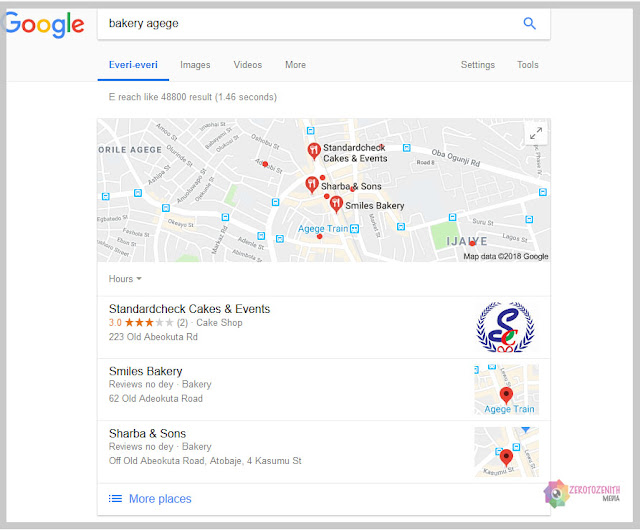
Whether you have a single location or a nationwide chain, a local SEO strategy is a key to driving more prospects through your doors.
In this post, I will be taking us through the key parts of your website that must be optimized to increase your prospects' chances of finding you in local search results.
Search engines rely on signals including local content, social profile pages, links, and citations to provide the most relevant local results to the user.
Optimize these three areas on your website to boost your chance of appearing in local search results:
On-Page, Local Profile Pages, and Inbound Links & Citations.
On-Page Signals
1. Set Up Your NAP.
NAP stands for Name, Address, and Phone Number. NAP is critical for businesses wishing to rank well in the local organic search results.
Search engines like Google take this data into account when determining which companies to show for geo-targeted searches.
Google as the most used search engine started ranking search results based on the searchers' geographical locations with the release of the Possum update in 2016.
So now the closer you are situated to a company's location, the more chances you have to see it among your search results.
You've got to make it easy for people and search engines to find you.
To do this you must set up your NAP.
This should be included as crawlable HTML text on your site.
Avoid the common mistake of only including the NAP within an image-- images can’t be crawled from search engines like HTML text.
The most common location for the NAP is in the footer or header of the site.
2. Create location pages.
Create location pages if you have more than one location for your business. Location pages provide readers with your NAP, business hours, location descriptions, promotions, and testimonials from happy/satisfied customers, and more.
It's also important you avoid duplicating content across multiple location pages. For single location businesses, create a locally descriptive “About Us” page.
3. Publish locally relevant content.
Be the local authority for your industry -- I recommend doing this through regularly publishing blog content.
Promote local industry gatherings and valuable educational content on your blog.
Think of top-of-the-funnel content that goes beyond what your business sells.
Local Profile Pages
1. Google+ Local
Create and verify a Google+ Local page for each of your locations. If you have multiple locations, link these to your location pages we mentioned above.
2. Remove duplicate listings.
Duplicate listings are common, as multiple employees may create a new listing not knowing one already exists. Avoid diluting reviews and links across several Google+ Local pages by removing duplicate listings.
3. Develop a system for building customer reviews.
Your customers may be new to giving Google+ reviews online. Make it easy for them by showing them a process.
Whitespark has this handy review handout generator to give to your customers if you need a place to start.
You could print out this handout for your customers in-store, or you could email to them after their visit.
Once you get more than 5 Google+ local reviews, you can start gaining those little yellow stars next to your local search listing.
4. Optimize your business categories.
Google+ Local profiles allow business owners to declare their type of business category.
Add at least 4-5 categories related to your business, including both broad and specific categories.
Inbound Links and Citations
You're probably familiar with inbound links -- links from another domain to your site.
Citations are different-- they're mentions of your business name and address on other sites. And a citation doesn’t necessarily contain a link.
Citations and external links are both important for off-page local SEO.
Here are a few tips on improving the chances you'll receive citations and inbound links.
1. Verify the consistency of your business address across the web.
Consistent spelling of your business name, address, and phone numbers is critical for local SEO.
For example, if your address is 42b, Ikota Villa Estate Road, then use that spelling on all of your listings. Avoid variations like 42b, Ikota Est Road.
Moz.com/Local is a useful tool to check for the consistent spelling of your local citations across the web.
2. Build these directory citations.
According to a source, these are the Top 10 Free Business Listing Websites In Nigeria.
- Google My Business.
- Facebook Business Page.
- VConnect Nigeria.
- Business List.
- Connect Nigeria.
- DealDey Nigeria.
- SME Arena.
- FineLib.com.
- NG Contacts.
- LGT Nigeria.
Remove any duplicate listings you find.
3. Earn local links.
Another way to improve your local search presence is by earning links from local sources.
You have a little less control over this, to be sure, but the key is in the word "earn."
Creating content worth linking to is the tried-and-true method of earning eyes on the internet.
This guide is intended to be a local SEO jumpstart for your local business. Some of the tips are one-off activities where you can set it and forget it (i.e. making sure your NAP is clearly written on your site).
On the other hand, building reviews and publishing locally relevant content is an activity your organization needs to do on a regular basis for long-term local SEO success or hire a Local SEO Company/Expert.
Keep both in mind as you work toward better online visibility for your business.


